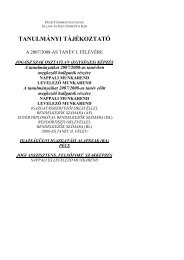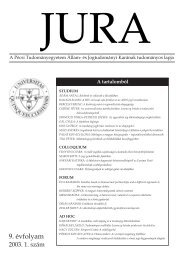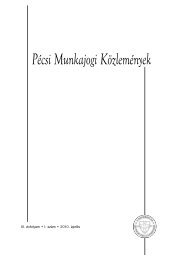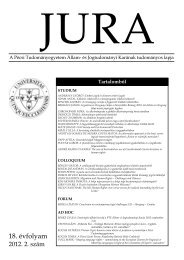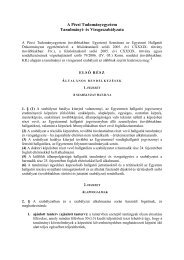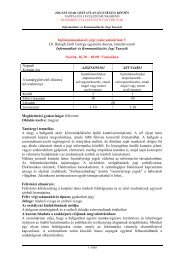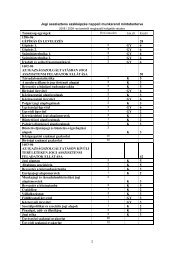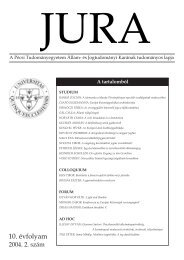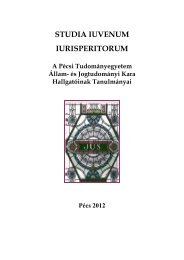Pécsi Munkajogi Közlemények - ICELL - ÃsszehasonlÃtó és Európai ...
Pécsi Munkajogi Közlemények - ICELL - ÃsszehasonlÃtó és Európai ...
Pécsi Munkajogi Közlemények - ICELL - ÃsszehasonlÃtó és Európai ...
You also want an ePaper? Increase the reach of your titles
YUMPU automatically turns print PDFs into web optimized ePapers that Google loves.
TANULMÁNYOK<br />
José João Abrantes – Rita Canas da Silva<br />
Freedom of contract and law: Geographical<br />
mobility clauses in Portuguese Labour Code.<br />
1. The Portuguese Labour Code of 2003 1 (hereinafter “PLC 2003”) assumed as one<br />
of its primary roles the reform of Labour Law in order to promote its flexibility. The Portuguese<br />
Labour Code of 2009 2 (hereinafter “PLC 2009”) followed the same line of<br />
direction.<br />
However, the idea of flexibility in itself, at least from a particular perspective, might<br />
conflict with the social function and basic meaning of Labour Law. In fact, a certain<br />
concept of flexibility – which seems the one reflected in these Codes – addresses the<br />
labour rules in force and, due to its protective nature, responsibility for the weakness<br />
of the economy. Thus a request for a “new” Labour Law arises which, at least in accordance<br />
with a liberal perspective, should reassure the value of the individual contract<br />
and ensure more effective business management, greater flexibility and lower labour<br />
costs – even with a decrease of the employees’ guarantees, which are assumed as part of<br />
the causes of the current economic crisis or at least of the difficulties in overcoming it.<br />
However, it may be just as incorrect to blame Labour Law for the failure of the<br />
market, as it would be inaccurate to state that the social essence and function of labour<br />
legislation has lost its meaning and purpose. Both the protective feature and the characteristics<br />
of this branch of Law are still justified, since the concerns that were at its<br />
genesis still remain: substantial equality and protection of the weaker contracting party.<br />
In many ways, the employment relationship remains as a relationship of power-subordination,<br />
in which the freedom of one of the parties (the employee) is likely to be<br />
endangered by the economic and social empowerment of the other (the employer).<br />
It is precisely this recognition of the substantial inferiority of the employees’ position<br />
that underlies not only the existing legal order, but also the importance given by the<br />
Portuguese Constitution to employees’ rights 3 .<br />
2. Labour Law has developed since equality between employer and employee was merely<br />
a fiction. Legal intervention was justified early in the field of labour relations given (i)<br />
that the employee arises as the weaker party in the contract and (ii) the real possibility<br />
of employers abusing powers given by the contractual framework. The genesis of this<br />
branch of Law is, therefore, connected to a relevant protective nature. Such a nature was<br />
enhanced through the interplay between law and collective autonomy – a way to offset<br />
the employer’s factual prevalence and to narrow possible abuses.<br />
1 Approved by Law n. 99/2003 of August 27, regulated by Law n. 35/2004, of July 29.<br />
2 Approved by Law n. 7/2009 of February 12.<br />
3 Article 53 of the Portuguese Constitution safeguards employees’ right to job security and forbids dismissals<br />
without just cause or for political or ideological reasons.<br />
PMJK 2010/2. 7



